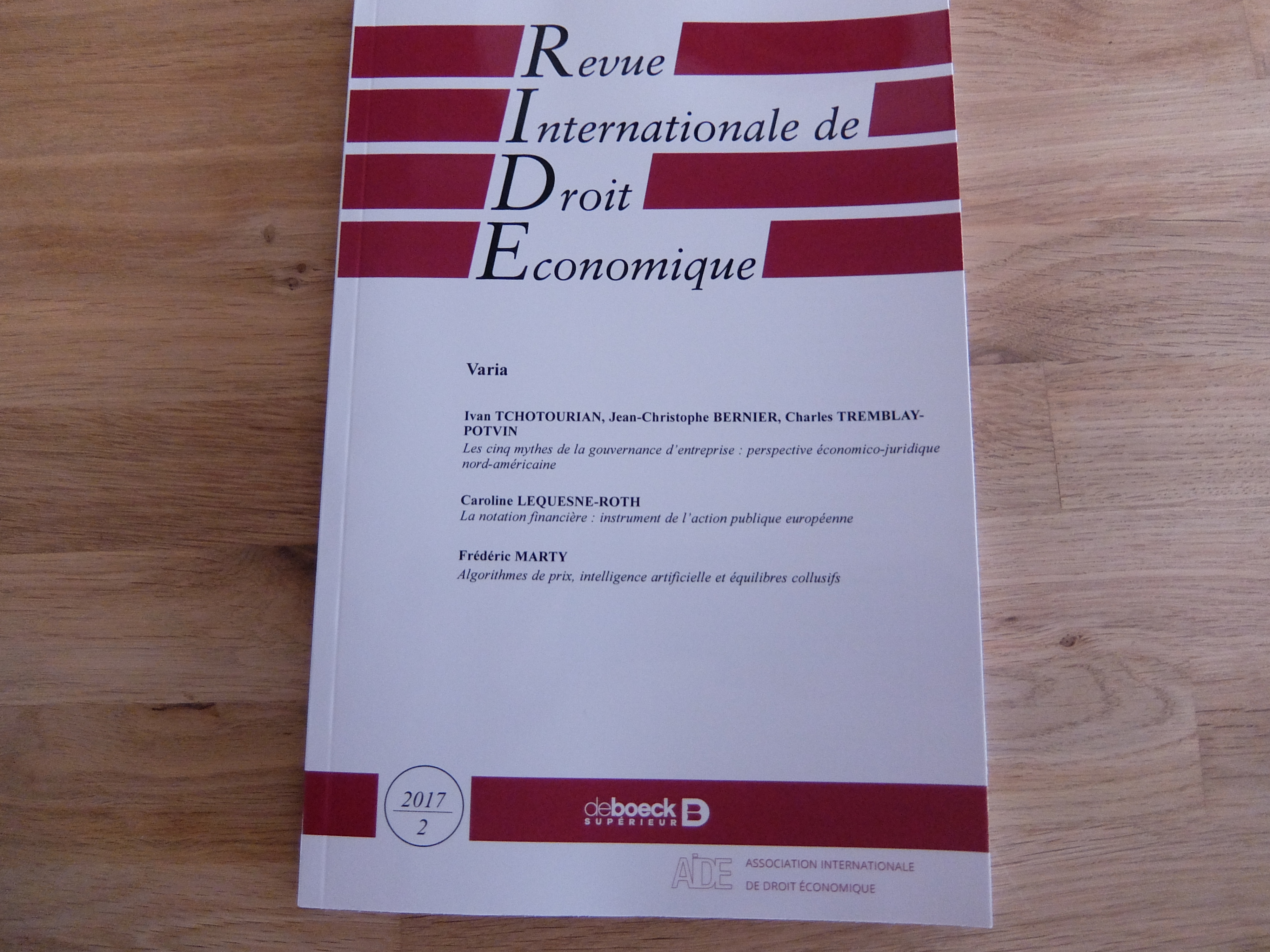Vien de paraître : Mythes de la gouvernance d’entreprise – osons déboulonner certaines idéologies entourant la gouvernance !


Avec MM. Jean-Christophe Bernier et Charles Tremblay-Potvin (étudiants au CÉDÉ), nous venons de publier dans la Revue internationale de droit économique (RIDE) un article critiquant certaines normes de gouvernance d’entreprise et proposant des alternatives : « Les 5 mythes de la gouvernance d’entreprise: perspective économico-juridique nord-américaine« .
Résumé : La gouvernance d’entreprise est aujourd’hui au cœur d’une profonde réflexion et fait l’objet de vifs débats sur le sens et le contenu des règles qui l’encadrent. Cet intérêt pour le sujet n’a rien d’étonnant, compte tenu de la place qu’occupent les entreprises sur l’échiquier mondial, et s’avère encore plus justifié depuis la crise économico-financière de 2007-2008 et les scandales qu’elle a permis de mettre en lumière. Pourtant, encore aujourd’hui, sous l’influence notable d’une culture anglo-américaine largement diffusée dans les cercles intellectuels, le cadre théorique dominant de la gouvernance d’entreprise repose sur une série de présupposés qui semblent relever davantage d’une mythologie que de la réalité objective, et ce, malgré une prétention à la scientificité de la part de ses promoteurs. Le présent texte analyse cinq de ces mythes et montre comment ils sont porteurs d’un message sur le plan idéologique.
Abstract : Corporate governance is still, to this day, the topic of the most intense discussions among scholars, especially concerning its legal and regulatory development over the past few years. As most of the current developments are dealing with global concerns about the impact of recent financial crises and their related scandals, the academics have yet been able to settle the score with long dated matters of corporate governance. Indeed, under the significant influence of an Anglo-Saxon culture, largely disseminated among the literature, the prevailing theoretical framework of corporate governance is still based on a series of preposterous presumptions. These presumptions of another time appear to originate more from rhetorical statements rather than deep analysis of the issues characterizing the early era of modern corporate governance. As they fulfilled their task, over the years, of supporting the development of capitalism throughout the industrial world and providing a legitimate rationale for corporate owners to adopt some aggressive and reckless behaviors, those corporate governance assumptions have since been held up as the cornerstones of an efficient social economy, profitable for all and everyone. As global economy has encountered a few unfortunate setbacks over the past decades, it is important to question ourselves on the legal value of these presuppositions, as they might have more to do with unsubstantiated myths than a complete legal and scientific work. As this Article has not the presumption of presenting the paramount truth on this topic, it has the purpose of highlighting the discrepancies between what have always been considered as the foundation of corporate governance and what it should have been if it had not being carried on only to nurture some illegitimate purposes of modern capitalism, such as shareholder primacy or financial profitability. Therefore, this Article is exploring five typical myths of corporate governance: (1) the corporation as a nexus of contracts, (2) the shareholders as owners of the corporation, (3) the shareholders as the only residual creditors of the corporation, (4) the effectiveness of shareholder activism and (5) the corporate governance as a legitimate rationale for shareholder primacy. As the aggregate theory of corporations, asserting that the corporation is nothing less than a nexus of contracts and that it may only benefit the shareholders, has made its way through most of the 20th century, it is now confronted with some more inclusive and realistic theories of unprecedented rigor, such as considering the corporation as an institution pursuing a social purpose. Therefore, considering the shareholders as the owners of the corporation might be of another time as well. Undeniably, what the recent ups and downs on the financial markets have shown the world is that the corporate directors ought to be considered as the center core of the corporation, acting collectively, but independently from the shareholders, and promoting the success of the company throughout the interests of all corporate stakeholders. Consequently, the shareholders cannot still be considered the owners of the corporation, dictating directors as to how they must govern, as the corporation has its own legal personality, effectively managed and controlled by the board of directors. Subsequently, neither they can be considered as the only residual creditors of the corporation, as all the other stakeholders’ investments are also at stake. More importantly, as shareholders became more active over the years, the effectiveness of their implication in the management of the corporation has been questionable, as they often lack a long term vision and considerations for other stakeholders’ interests. Finally, it is quite arguable to still promote shareholders’ primacy in today’s world, as law, jurisprudence and doctrine have, timidly but still, embraced the stakeholder theory which states that the board of directors has to consider the whole corporation interests first, rather than simply focus on short term profitability for the shareholders.
À la prochaine…
Ivan Tchotourian
Ce contenu a été mis à jour le 12 janvier 2018 à 16 h 37 min.
Commentaires